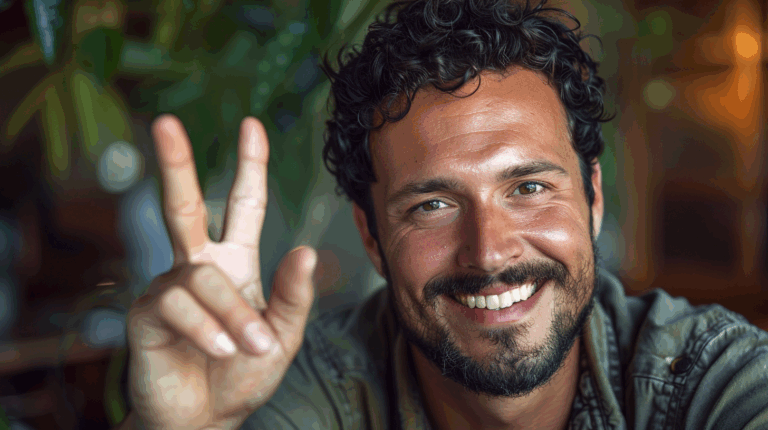By Mike, The SugarFreeMan
Founder of SugarDetox.com and the 30-Day Sugar Freedom Challenge
If you’ve ever tried to quit sugar, you know the strange guilt that creeps in. You tell your kids “no” when they ask for cookies. You stop stocking the pantry with “treats.” Your spouse gives you the side-eye when family traditions shift. And a small voice whispers: “Am I being selfish?”
Here’s the truth: quitting sugar often feels selfish because it means putting your health first. But in reality, it’s the most selfless thing you can do-for yourself and for the people you love.

Featured Snippet Summary: Quitting sugar may feel selfish, but it’s actually self-care that benefits everyone around you. Putting your own oxygen mask on first helps you show up fully for your family.
This article was review by Dr. Camela McGrath, MD, FACOG. Find more about her here
The Guilt We Were Taught to Carry
Growing up, many of us were taught-especially women-that caring for ourselves was somehow wrong. Maybe you heard phrases like:
- “Who do you think you are?”
- “You’re getting too big for your britches.”
These weren’t harmless sayings. They were subtle control tactics meant to keep us small. Over time, they trained us to put everyone else first-even at the expense of our health.
“You aren’t any good to your family if you’re running on fumes. True love means showing up as your best self, not burning yourself out.”
The People-Pleaser Trap
I know this one personally. For years, I was a people-pleaser. I thought being “nice” and self-sacrificing would win me love. Instead, it left me resentful and unhealthy. Maybe you’ve felt the same. That tension between what you know you need and what you’ve been told you should do is exhausting.
The Oxygen Mask Rule
If you’ve ever flown, you’ve heard the announcement: “Put your own oxygen mask on first before helping others.” Why? Because you can’t help anyone if you’re gasping for air yourself.
It’s the same with sugar addiction. You can’t show up fully for your kids, your spouse, or your community if you’re trapped in cravings, energy crashes, and health struggles. Taking care of yourself isn’t selfish-it’s survival.

Reframing Self-Care
Self-care isn’t about spa days or bubble baths (though those can help). It’s about:
- Feeding your body real food that doesn’t hijack your brain.
- Resting so you don’t snap at your kids out of exhaustion.
- Walking around the block so stress doesn’t pile up.
When you put your health first, your family gets the best version of you-not the burned-out one barely hanging on.
If you’re serious about this, our 30-Day Sugar Detox Challenge will walk you through every step. You don’t have to guess anymore.
How Sugar Manipulates More Than Cravings
Sugar addiction isn’t just physical-it’s emotional. Many of us learned to equate food with love. My father, for example, would say, “Mike, you do the best job with dishes. Do it for your mother, she works hard.” It was charming manipulation, but it trained me to seek approval by sacrificing my own needs.
That same programming keeps us stuck with sugar. We think, “I can’t change my diet; it’ll inconvenience everyone else.” But the truth? That thinking is the trap keeping you sick and stuck.
Breaking Free of Old Programming
Here’s the shift: your learned patterns are not your destiny. You can rewrite them. You can decide that your health matters-not in place of your family’s, but for their benefit.
When you heal your relationship with sugar, you break the cycle for yourself and for your kids. They learn by watching you. They see what it looks like to stand up for your health without guilt.
Practical Steps to Start Putting Yourself First
Ready to practice guilt-free self-care? Start here:
- Name the guilt. When you feel selfish, notice it. Naming it reduces its power.
- Reframe the story. Remind yourself: “Taking care of me is how I take care of them.”
- Start small. Take a walk, drink water, prep one healthy meal. Little wins add up.
- Get support. Join a community where people get it and remind you that you’re not alone.

The 30-Day Sugar Detox Challenge was built for this. Daily guidance, community support, and proven craving tools-so you can finally put your oxygen mask on first.
Final Thoughts
Quitting sugar isn’t selfish. It’s the bravest and most loving thing you can do. When you step into health, you step into freedom-and your whole family benefits.
About the Author
Mike Collins, known as The SugarFreeMan, has been sugar-free for over 35 years and is the founder of SugarDetox.com. He has helped tens of thousands of people break free from sugar addiction through his evidence-based approach combining nutritional science with practical behavior change strategies.
Medical Disclaimer
This article is for educational purposes only and is not intended to replace professional medical advice. Always consult with a healthcare provider before making significant dietary changes, especially if you have underlying health conditions.
FAQ Section
Q: Why does quitting sugar feel selfish?
A: Many of us were raised to put others first, so prioritizing our health feels uncomfortable. But quitting sugar allows you to show up stronger for those you love.
Q: How does sugar addiction affect family life?
A: Sugar cravings, mood swings, and energy crashes can impact relationships. Healing your sugar dependency helps restore patience, presence, and connection at home.
Q: What does “put your oxygen mask on first” mean in recovery?
A: It means you must care for your own health first. Just like on an airplane, you can’t help others if you’re running on empty.
Q: How do I deal with guilt when quitting sugar?
A: Name it, reframe it (“taking care of me is taking care of them”), and take small steps toward healthier routines. Supportive communities can help ease guilt.
Q: How can I start putting myself first without neglecting my family?
A: Begin with small daily choices-like drinking water or prepping one healthy meal. These shifts improve your health and your ability to care for your loved ones.





